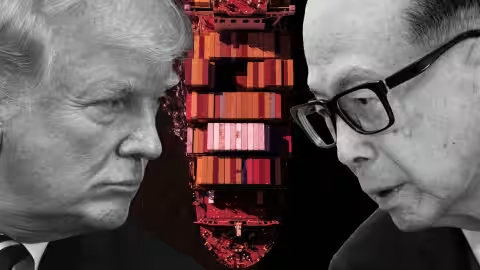A Hong Kong billionaire, often referred to as “Superman” for his larger-than-life persona, has found himself at the center of a tense global dispute over the Panama Canal, one of the world’s most strategic and vital trade routes. The billionaire, whose wealth stems from a diverse portfolio of industries, including logistics, infrastructure, and transportation, has become embroiled in a legal and economic battle that could reshape the future of the Panama Canal and the global shipping industry.
The Panama Canal, a vital waterway connecting the Atlantic and Pacific Oceans, has long been a focal point for global trade. Serving as a shortcut for ships transporting goods between the two oceans, it plays a crucial role in reducing travel time, fuel consumption, and transportation costs. Over the years, the canal has attracted interest from major global players, and its significance has only grown in the modern era of globalization.
Control over the canal, or influence over its operations, holds immense power. The waterway facilitates the movement of billions of dollars worth of goods each year, making it a strategic asset for any nation or company that can leverage it. The geopolitical implications of the Panama Canal are far-reaching, affecting global trade routes, regional power dynamics, and economic stability.
The Hong Kong billionaire in question, whose identity has been kept under wraps by some media outlets, has earned the moniker “Superman” for his bold business ventures and larger-than-life character. A self-made tycoon, he has amassed a fortune in diverse industries, with a particular focus on the shipping and logistics sectors. His companies own significant portions of shipping fleets and hold key contracts in the transportation of goods through the Panama Canal.
His rise to prominence has been marked by aggressive expansion and strategic investments, particularly in developing infrastructure and maritime logistics. His companies have been instrumental in modernizing key ports and waterways, solidifying his influence on the global shipping market. However, this growth has also attracted controversy, especially as he increasingly seeks control over key choke points in global trade.
The billionaire’s interest in the Panama Canal is part of a larger global push to control or influence critical trade routes. In recent years, he has been involved in negotiations and legal battles to secure long-term agreements for using the canal’s shipping lanes. With his vast shipping fleet, he stands to benefit immensely from such agreements, giving him greater sway over global trade.
However, his efforts to extend his control over the canal have not been without opposition. Political and business leaders in Panama, as well as foreign governments, have raised concerns about the concentration of power in the hands of a single individual or corporation. Critics argue that such concentration could lead to higher shipping costs, unfair competition, and potential exploitation of Panama’s resources for private gain.
The dispute has escalated, with some factions calling for stronger regulatory measures to limit the influence of private corporations on the canal’s operations. Meanwhile, others defend the billionaire’s efforts, arguing that his investments could help modernize the canal’s infrastructure, increase efficiency, and ultimately benefit global trade.
The outcome of this battle will have far-reaching implications, not just for the Panama Canal, but for global trade and geopolitics. Panama, as a sovereign nation, has historically maintained control over the canal since it was handed back by the United States in 1999. However, the growing presence of private interests like the Hong Kong billionaire’s empire has raised questions about the balance between public control and private investment.
For global shipping companies, the stakes are high. The billionaire’s push for greater influence over the canal could lead to significant changes in how goods are transported between continents, potentially driving up costs for consumers and businesses. On the other hand, if successful, the billionaire’s vision for modernization could lead to efficiencies that benefit the global economy.
The battle over the Panama Canal is a reflection of broader global trends where private business magnates increasingly hold sway over national resources and critical infrastructure. As the world’s largest economies vie for control over vital trade routes and ports, the Panama Canal has become a focal point for international diplomacy, corporate competition, and political maneuvering.
The Hong Kong billionaire’s role in this high-stakes game underscores the growing intersection between business and geopolitics. In this battle, the billionaire is not only fighting for control over a crucial waterway but also staking a claim in the global power structure.
As the legal and political battles unfold, it remains to be seen how the Panama Canal’s future will evolve. Will the “Superman” billionaire succeed in cementing his influence over the waterway, or will political resistance from Panama and the international community push back against his growing control? The stakes are high, and the outcome will likely reverberate across the global shipping industry and beyond.
In the end, the battle over the Panama Canal is not just about business interests; it is a microcosm of the larger global competition for control over resources that shape the modern world economy. The decisions made in the coming months could have lasting impacts on the future of global trade and the balance of power between nations and private enterprises.



